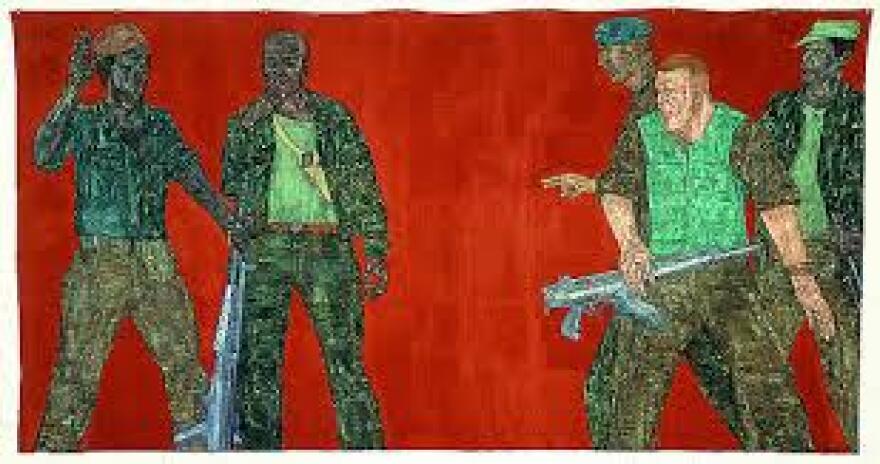Between 2009 and 2011, a local art history professor sold two dozen paintings from her personal collection. The works were all by a major American artist she claimed to know personally. The purchaser was a wealthy Wall Street commodities trader.
Now, it appears these paintings--valued at nearly $700,000--may have been forgeries.
The courts are involved, the buyer isn’t commenting, and the seller, whose whereabouts were a mystery for months, has surfaced in Keene, New Hampshire.
The artist at the center of this case is Leon Golub, a New York-based painter who died in 2004. Golub’s works, some small, others massive wall-sized canvasses, aren’t always easy to look at. They deal with violence and power, including roughly sketched images of prisoners being tortured, of police brutality and dictators.
Golub may not be a household name, but his works are in the Museum of Modern Art, the Art Institute of Chicago, and the Whitney Museum.
“I once described myself as a machine for producing monsters, and I keep producing them,” Golub told an interviewer for a documentary. “But my production of monsters is really miniscule, compared to the real production of monsters.”
British-born Andrew Hall is a fan of Leon Golub. He’s also well-known on Wall Street as an oil trader, notorious for garnering a $100 million bonus at the height of the Great Recession.
“Whoever you are, you are operating essentially within a budget,” Hall told a Florida PBS station during a roundtable on art collecting. “And that budget, I think, can go much farther when you seek out overlooked corners of the art world.”
According to court filings, in 2009, Hall bid $47,500 at a Christie’s auction, taking home an untitled Golub painting. Hall would later come to believe that the painting had been consigned to the auction house by a New Hampshire woman, Lorettann Gascard, and her son, Nikolas Gascard.
'These works were not painted by Golub. They are clever forgeries.'
The Gascards allegedly told Christie’s that they acquired the Golub painting directly from the artist, who had been a teacher of Lorettann’s in college in the late 1960s.
Hall was interested in purchasing more works, and eventually reached out to the Gascards directly. By the end of 2011, Hall owned 24 Golub paintings acquired through the Gascard family.
Then, in 2015, Hall and staff members at his foundation planned a major exhibit of more than 60 Golub works. In preparation, the Hall Art Foundation contacted the estate of Leon Golub to check details of the art works, including the exact titles and the dates.
The Golub estate wrote back to the Foundation confirming many of the works, but the artist’s family also raised a red flag.

While they maintained an extensive inventory of nearly everything Golub had painted, there were no records for the 24 paintings Hall had acquired from the Gascards. They said there were “unusual formal characteristics” in these works, and that members of the Golub family had never heard Leon mention a friendship with Lorettann.
They concluded that the works were “likely forgeries.”
A Shock, But Not Shocking
It’s not often that Rindge, N.H., finds itself in the spotlight of the international art world. But neighbors of the Gascards, who lived in this small community until recently, say the case of alleged forgery is odd, but not exactly shocking.
“When I read the account of that, I was not surprised at all,” says a neighbor who asked to remain anonymous. “I liked her personally when I met her. I talked to her, her son. But I was absolutely not surprised at all when this happened.”
The neighbor described her as friendly, deeply intelligent, but also secretive and, at times, peculiar.
A full time professor at nearby Franklin Pierce University, Gascard, 68, was born in New York City. According to an online biography, she earned a Ph. D. in Germany, and lived and worked in Bangladesh, Austria and several African countries.
She began teaching art history at the school in 1997. Students described her as a striking figure, often dressed in all-black. Like any professor, she had her fans and her detractors.
'Since the litigation is ongoing we are only at liberty to state that we intend to address these false allegations vigorously.'
“I did learn a lot about art history,” says Cathyrn Michaud, a 2009 graduate of Franklin Pierce who took Gascard’s class as a freshman. “I think she knows her stuff. But as far as person-to-person, she was not an easy person to be around, by any means.”
Gascard left Franklin Pierce in 2015 after settling an age discrimination suit with the school. Court documents in that case describe a contentious work environment, a feeling that was confirmed by several faculty members.
Gascard now finds herself back in the legal system. After learning of the alleged Golub forgeries, Andrew Hall filed a complaint in New Hampshire’s federal court last September against both Gascard and her son seeking damages of nearly $700,000.
For months, the whereabouts of the Gascards were unclear. Neither responded to a court summons, they moved out of their apartment in Rindge, and a private investigator hired by Hall couldn’t find them.
Last week, however, the Gascards re-emerged in nearby Keene, living in another modest white apartment. While they declined an interview request, emails from both Lorettann and Nikolas to NHPR say they will fight the “false allegations vigorously.”
But they haven't yet filed a formal response in court, or provided any further explanation for how exactly they came into possession of what appear to be 24 forged Leon Golub paintings.








